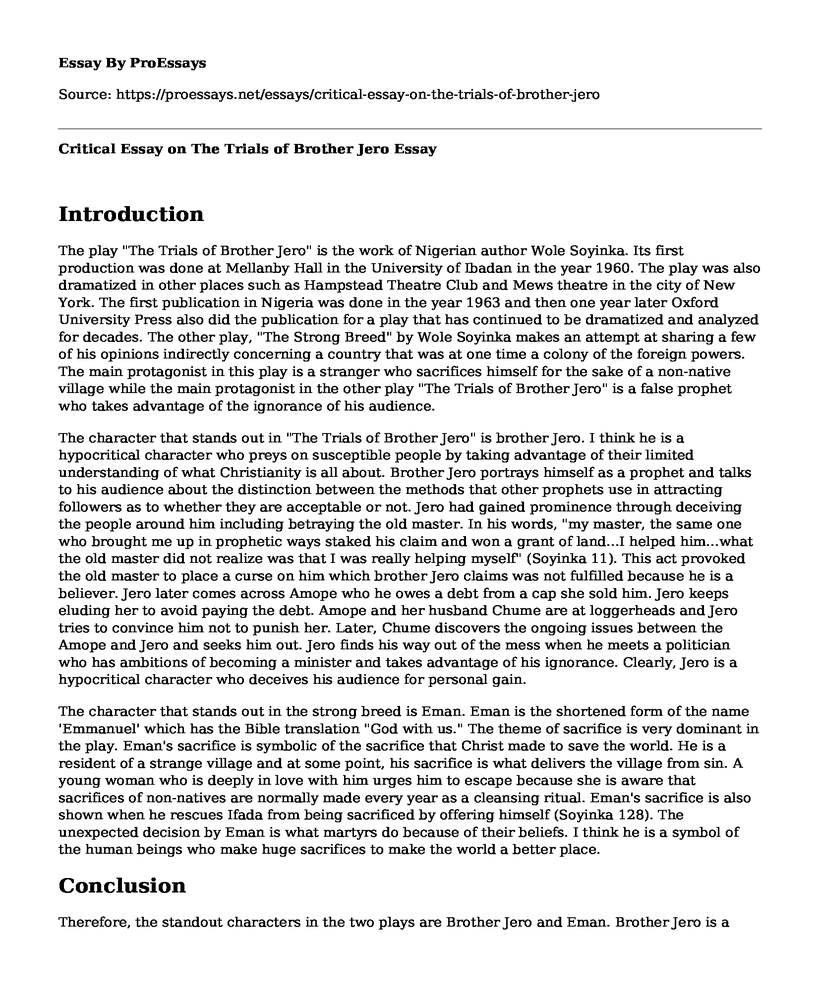Introduction
The play "The Trials of Brother Jero" is the work of Nigerian author Wole Soyinka. Its first production was done at Mellanby Hall in the University of Ibadan in the year 1960. The play was also dramatized in other places such as Hampstead Theatre Club and Mews theatre in the city of New York. The first publication in Nigeria was done in the year 1963 and then one year later Oxford University Press also did the publication for a play that has continued to be dramatized and analyzed for decades. The other play, "The Strong Breed" by Wole Soyinka makes an attempt at sharing a few of his opinions indirectly concerning a country that was at one time a colony of the foreign powers. The main protagonist in this play is a stranger who sacrifices himself for the sake of a non-native village while the main protagonist in the other play "The Trials of Brother Jero" is a false prophet who takes advantage of the ignorance of his audience.
The character that stands out in "The Trials of Brother Jero" is brother Jero. I think he is a hypocritical character who preys on susceptible people by taking advantage of their limited understanding of what Christianity is all about. Brother Jero portrays himself as a prophet and talks to his audience about the distinction between the methods that other prophets use in attracting followers as to whether they are acceptable or not. Jero had gained prominence through deceiving the people around him including betraying the old master. In his words, "my master, the same one who brought me up in prophetic ways staked his claim and won a grant of land...I helped him...what the old master did not realize was that I was really helping myself" (Soyinka 11). This act provoked the old master to place a curse on him which brother Jero claims was not fulfilled because he is a believer. Jero later comes across Amope who he owes a debt from a cap she sold him. Jero keeps eluding her to avoid paying the debt. Amope and her husband Chume are at loggerheads and Jero tries to convince him not to punish her. Later, Chume discovers the ongoing issues between the Amope and Jero and seeks him out. Jero finds his way out of the mess when he meets a politician who has ambitions of becoming a minister and takes advantage of his ignorance. Clearly, Jero is a hypocritical character who deceives his audience for personal gain.
The character that stands out in the strong breed is Eman. Eman is the shortened form of the name 'Emmanuel' which has the Bible translation "God with us." The theme of sacrifice is very dominant in the play. Eman's sacrifice is symbolic of the sacrifice that Christ made to save the world. He is a resident of a strange village and at some point, his sacrifice is what delivers the village from sin. A young woman who is deeply in love with him urges him to escape because she is aware that sacrifices of non-natives are normally made every year as a cleansing ritual. Eman's sacrifice is also shown when he rescues Ifada from being sacrificed by offering himself (Soyinka 128). The unexpected decision by Eman is what martyrs do because of their beliefs. I think he is a symbol of the human beings who make huge sacrifices to make the world a better place.
Conclusion
Therefore, the standout characters in the two plays are Brother Jero and Eman. Brother Jero is a hypocritical character because he takes advantage of other people while hiding under the guise of being a man of the Lord. He takes advantage of the people around him to gain wealth and resources, for instance, the land he took from his old master. Eman, on the other hand, is a martyr who dies because of his faith. The village he resides in sacrifices non-natives every new year as a form of ritual. Eman has an opportunity to escape but he does not do that. Instead, he rescues Ifada by taking his place.
Works Cited
Soyinka, Wole. Five plays: A dance of the forests, The lion and the jewel, The swamp dwellers, The trials of Brother Jero [and] The strong breed. Oxford University Press, 1964.
Cite this page
Critical Essay on The Trials of Brother Jero. (2022, May 16). Retrieved from https://proessays.net/essays/critical-essay-on-the-trials-of-brother-jero
If you are the original author of this essay and no longer wish to have it published on the ProEssays website, please click below to request its removal:
- Propaganda in Modern Times Essay Example
- The Film's Representation of the Book: The Leopard Essay
- Critical Essay on Humor in the "Wedding Ringer"
- Cindy Sherman Photography Essay
- Social Media and Government Regulations Essay Example
- Rhetorical Triangle Analysis of Virginia Woolf's Speech "Professions for Women"
- Essay Example on Fresco Painting: Ancient Artistry in Modern Art







